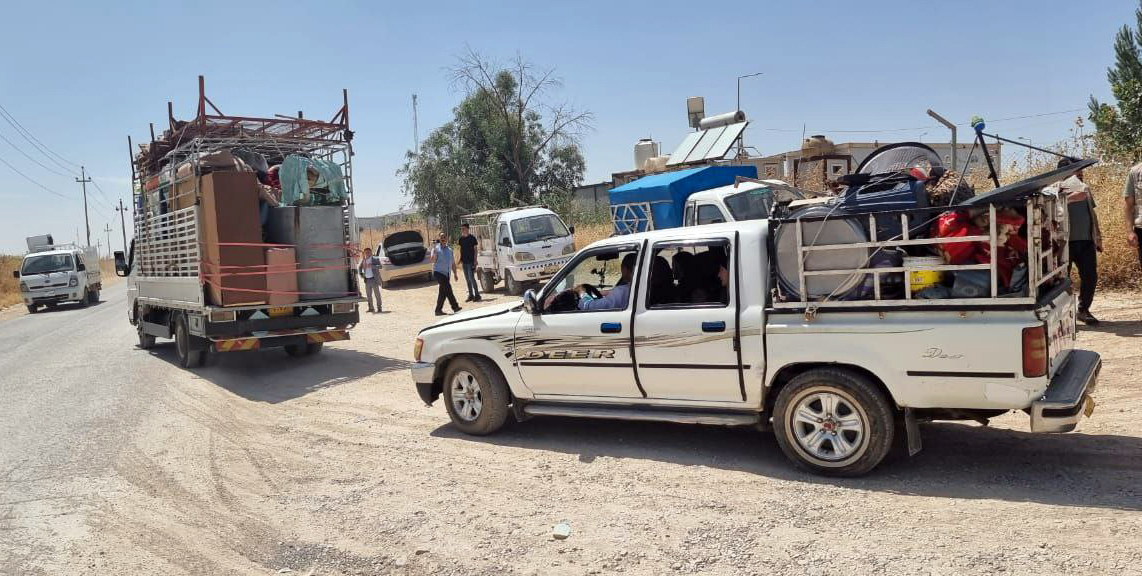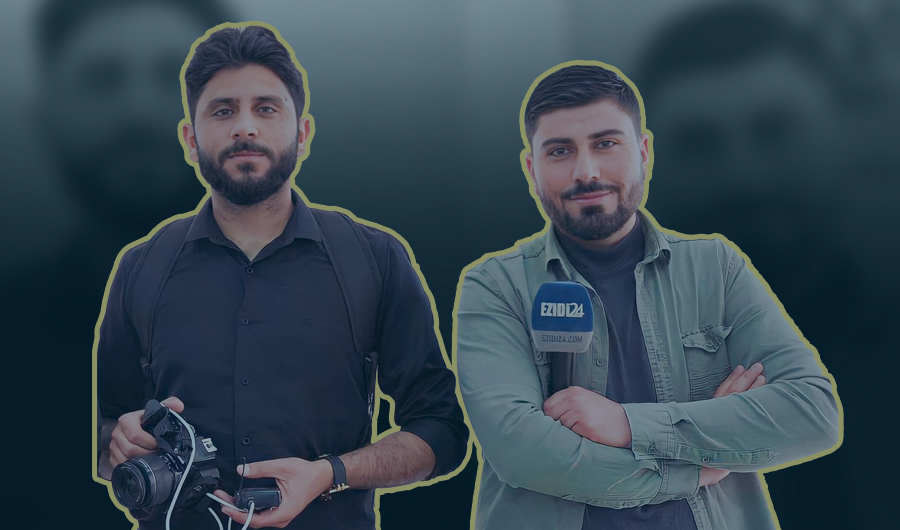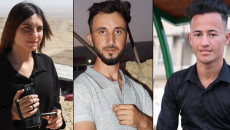They put Farid and his cameraman next to each other inside a room at the Iraqi army checkpoint, filmed them with an officer's mobile phone, and then released them with " threats," without returning their microphone, camera, and USB memory card.
The incident occurred on the afternoon of June 6, 2023, at the Umm al-Shababik checkpoint within the borders of Sinjar district (western Nineveh), while a number of displaced Ezidi (Yazidi) families were on their way to return to their homes from Sharia camp for the Internally Displaced Persons IDP, in Northern Province of Duhok.
"At one o'clock in the afternoon, we arrived as a team from the (Ezidi 24) media organization at the checkpoint. They asked us for a license to cover the return of the displaced. At first, the point officer did not allow us to cover the event, then we spoke with two other officers and they agreed," according to Farid Nawaf, reporter of (Ezidi 24).
Nawaf, who was facing such a situation for the first time, did not register any complaint against the checkpoint, and explained to (KirkukNow), “We said that we came to cover the event of the return of the displaced only and that we would not link the issue to any conflicts and political issues, so the two officers, one of them with the rank of a lieutenant colonel and the other a captain, allowed us do our work.”
On June 6, 307 displaced Yazidis returned from Sharya camp in Dohuk to their homes after spending 9 years under tents, according to a statement by the Iraqi Ministry of Migration and Displacement.
There are more than 664,000 displaced persons in the Iraqi Kurdistan Region IKR, 30% of whom are Ezidis, mainly from Shingar, home to the Ezidi community.
Ezidi24 introduces itself as an independent media outlet that covers the events in the Ezidi region and the affairs of the Ezidis in Kurdish, Arabic, English and German.
"We had recorded only a few clips of the procession of the displaced, when the Iraqi immigration and displaced official at the checkpoint asked us to prevent us from covering, although the United Nations representatives were there and told us that we could cover the event, but he was insisting on preventing us, so we decided to return to the Shingal (Sinjar)."
Nawaf says that the checkpoint officer, who is in the rank of lieutenant, called them and asked them why they covered the event.
"He asked us to hand him the camera equipment and the storage slides. Everything was confiscated. We told him that we had obtained the approval of the other two officers, but to no avail."
Journalists face challenges as they are subject to detention and harassment by the Iraqi Security Forces ISF which send them to courts as criminals and view them as enemies, a matter led to retreat in media coverage in the disputed territories.
“A media environment in which press outlets were closely affiliated with specific political parties and ethnic factions, an opaque judiciary, and a still-developing democratic political system, combined to place considerable restrictions on freedom of expression, including the press,” said the 2021 Human rights practices in Iraq by the US department of State, published in April 2022.
The local and international organizations, human rights advocates and members of the Iraqi and Kurdistan parliaments, express their grave concern that freedom of press and expression is increasingly under threat all over Iraq including the Iraqi Kurdistan Region IKR.
The Press Freedom Advocacy Association in Iraq PFAA monitored 280 cases of violations against journalists from May 3, 2021 to May 3, 2022, which marks World Press Freedom Day. Baghdad and Erbil were ranked first with 56 violations, followed by Kirkuk province with 37 cases.

The return of displaced Ezidis from the camps to Sinjar, Dohuk, June 6, 2023. Iraqi Ministry of Migration and Displacement.
According to the Journalists' Rights Law in Iraq and the Iraqi Kurdistan Region IKR's Press Law, journalists have the freedom to work and be present in all press conferences and public meetings for professional duty.
"They put me with my cameraman in a room at the checkpoint, there the lieutenant filmed us with his mobile phone as if we were criminals, then he sent our photos and video clips to another person and told him that they had confiscated everything from us and erased the video clips that we filmed," according to (Ezidi 24) reporter.
(KirkukNow) tried for days to get statements from the security officials in shingal, but they refused to comment.
Nawaf says that the lieutenant asked them to leave the checkpoint after he filmed them, and when they asked him to take back the camera and the memory sticks, "the lieutenant got angry and said, “Go or I will smash your camera and confiscate all your other equipment.'"
After that altercation, Nawaf and his cameraman, Diab Jalal, left the checkpoint.
Hours after the accident, after the intervention and follow-up of the (Ezidi 24) media institution - Nawaf was contacted by the checkpoint to receive the camera and the memory stick.
There are more than 664,000 IDPs in the Iraqi Kurdistan Region IKR, most of them from Nineveh Governorate, especially the Sinjar district, 30% of whom are Ezidis, in addition to that the fate of over 2,600 Ezidis who were kidnapped by ISIS is still unknown.
Shingal, 120 km west of Mosul, a disputed area in Ninewa province, was captured by ISIS on August 3, 2014, and thousands of people were killed, kidnapped and displaced until it was captured on November 13, 2015.






